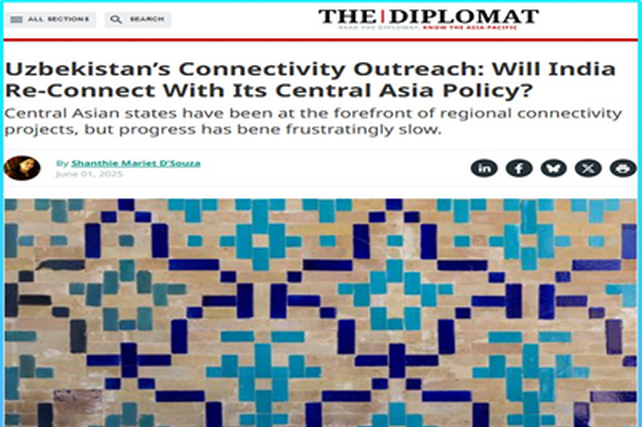
The Termez Dialogue — A New Milestone in Strengthening Connectivity Between Central and South Asia
The Termez Dialogue — A New Milestone in Strengthening Connectivity Between Central and South Asia
Tashkent, Uzbekistan (UzDaily.com) — The American publication The Diplomat featured an article by Indian professor Shanti Mariet D’Souza titled “Uzbekistan’s Connectivity Development: Will India Restore Its Central Asia Policy?”
The article places special emphasis on the outcomes of the Termez Dialogue on connectivity between Central and South Asia, held on May 19–21 this year in the city of Termez, Uzbekistan.
“This forum is a logical continuation of President Shavkat Mirziyoyev’s efforts to strengthen connectivity between Central and South Asia, which found expression in the UN General Assembly resolution adopted in 2022,” notes Shanti Mariet D’Souza.
According to the expert, the Termez Dialogue has become a large-scale, multilateral regional platform that brought together a wide range of participants, including representatives of government bodies, international organizations, the financial sector, business communities, and the expert community.
The specialist particularly highlighted that the event contributed to a strategic reassessment of approaches to enhancing cooperation between the regions and the implementation of transregional projects. The participation of private sector representatives and financial institutions in the Termez Dialogue was especially important, as these actors now play a key role in driving the economic growth of states.
“Moreover,” the professor reports, “a distinctive feature of the forum was the repeated emphasis by organizers and participants on resolving issues on a ‘bottom-up’ basis — that is, through public engagement, which fully corresponds to current realities.”
The analyst is confident that the Termez Dialogue can promote security by expanding multilateral cooperation, building trust, and stimulating economic development.
Furthermore, the author asserts that the participation of the Afghan delegation in the forum demonstrated Tashkent’s commitment to involving Afghanistan in regional connectivity, which is a key factor for maintaining peace, security, and stability across the vast Eurasian continent.
“Moreover, the reintegration of Kabul into the region — which Uzbekistan is actively facilitating — may contribute to establishing the Taliban as a responsible member of the international community,” Shanti Mariet D’Souza believes.
Speaking about the symbolism of holding the event in Termez, the Indian expert emphasizes that this city has historically been located at the crossroads of Central and South Asia. For centuries, Termez has served as a crossroads of civilizations and a center for intercultural and interfaith dialogue, cementing its status as a transit hub.
“Today,” the analyst states, “Termez is becoming a regional hub undergoing a phase of transformation.” She notes that favorable conditions for this are created by new infrastructure projects, including the Termez International Trade Center and the International Multifunctional Transport and Logistics Hub “Cargo Center.”
The establishment of a free trade zone in Termez is an innovative initiative capable of ensuring long-term and sustainable peace in Afghanistan through economic integration.
In this context, Shanti Mariet D’Souza pointed to the strategic value of connectivity amid the crisis in the international relations system. The expert calls on the Indian government to take a leading role in interregional connectivity as a key condition for revitalizing its Central Asia policy.
Special emphasis was placed on Uzbekistan’s role in advancing connectivity between Central and South Asia. “Uzbekistan, as a ‘middle power,’ has become a center of attraction, a connecting link between Central and South Asia, as well as the Eurasian regions as a whole,” the professor asserts.
Overall, the expert concludes that Uzbekistan’s growing economic strength, proactive foreign policy, and initiative in shaping the Central Asian region are transforming Uzbekistan into a “middle power.” At the same time, President Shavkat Mirziyoyev is seen as the driving force behind all processes aimed at deepening interregional connectivity.
In this regard, New Delhi considers strengthening cooperation with Tashkent to be of great importance.